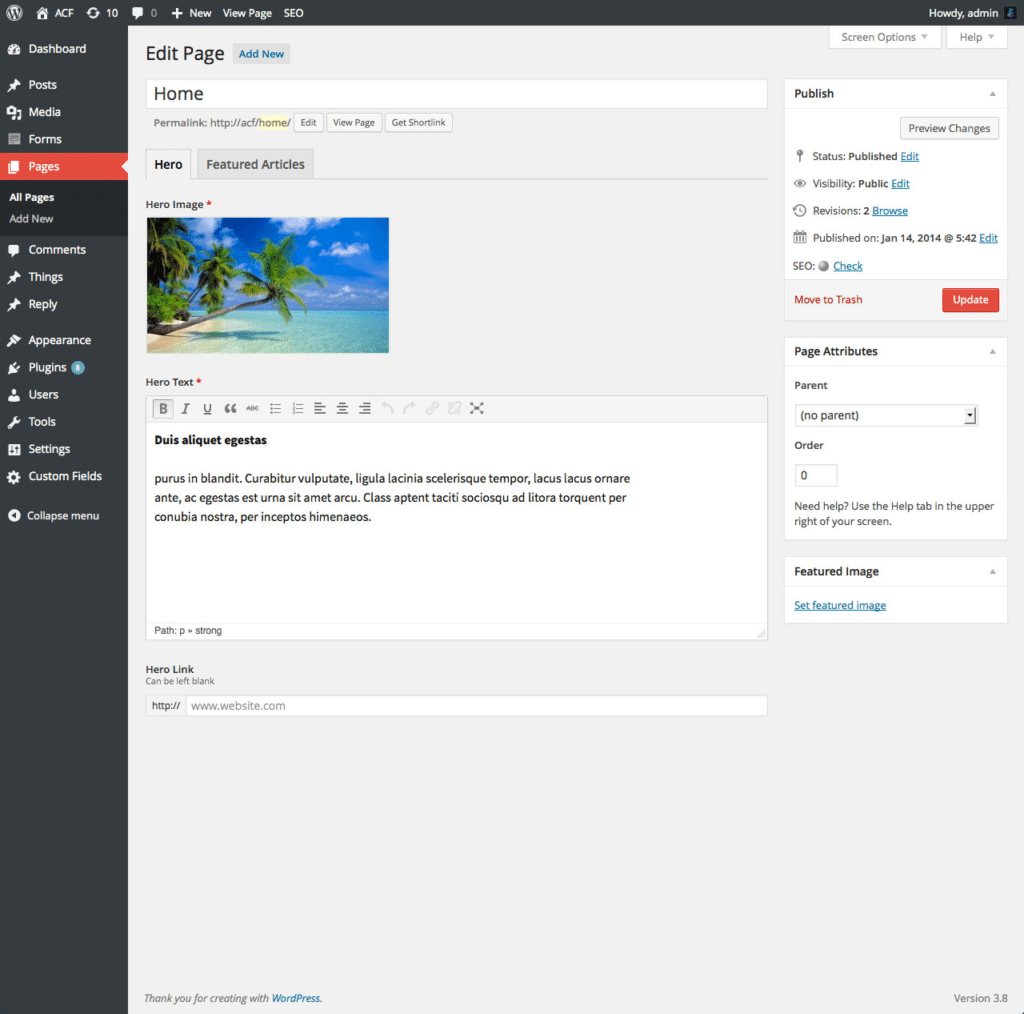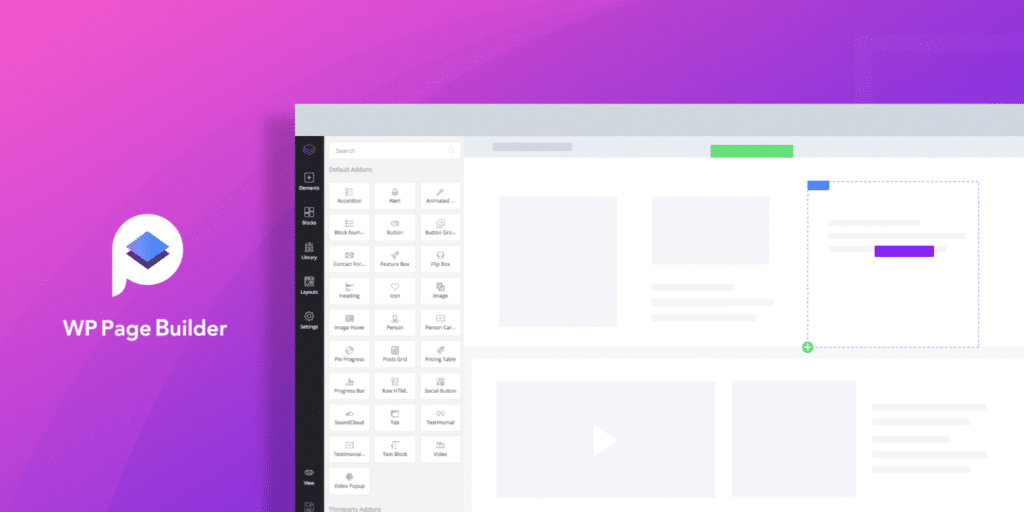Learn the difference between page builders, custom post types, and advanced custom fields and how you can use them for your WordPress website design.
Custom WordPress development is usually limited to theme customisation and adding new functionality within the WordPress framework.
But this type of custom development is not only expensive it often costs effort that goes in vain. Especially when there are so many themes and theme customisation plugins available for users.
Even professional WordPress developers are now moving towards using page builders and block-based template layouts for designing websites.
However, many don’t know that page builders are of two types:
- Custom Field Creators
- Block-based Templates
The first one is not very popular among the WordPress community because it is not a no-code solution for WordPress development. It requires creating custom fields and then adding them in the WordPress functions file to initiate (call) them.
On the other hand, the second one is the usual page builder that WordPress users use to customize the layout of their websites. Page builders like Visual Composer, Beaver Builder, and Elementor fall in this category.
In this article, we will discuss which one is better for professional WordPress development, and why.
Advanced Custom Fields/Custom Post Types vs Page Builders
Advanced Custom Fields is a plugin that works with custom post types to edit layouts of pages, posts, and other post types. On the other hand, page builders introduce block-based functionality within the theme – whether on posts, pages, and other post types – to create a layout design.
Let’s discuss each WordPress layout customization plugin in detail.
ACF and CPTs: What are they?
Consider Active Custom Fields as a subcategory or the operational element of Custom Post Types. CPTs are what we use on our website to create a visual design.
We have post types such as pages, posts, products (if WooCommerce is installed). WordPress allows users to create their own custom post types if they want to add new functionality or make changes to their WordPress websites/eCommerce website design. Restaurants can introduce custom post types called Menu, and hospital websites can introduce a custom post type called Billing.
All these custom post types will have their own content available. Some may have images, some may have columns and rows, and some may have a Google map.
Advanced Custom Fields introduces new fields within these custom post types. So let’s consider that you run a mobile comparison portal. Each mobile has a set of specifications that include memory, storage, processor, and camera. You have a custom post type called product where all the mobile phones are listed.
With Advanced Custom Fields you can create fields for memory, storage, processor, and camera and edit them from the WYSIWYG editor. They will then show up in their specific layout on the product page.

This makes it easier for data entry specialists to add specifications of each mobile phone without editing the content from the database.
>>> Double Your Revenue with Professionally Designed WordPress Website. Book a Call.
Advanced Custom Fields: Where they Win?

Advanced Custom Fields are very useful in a lot of areas.
- Ecommerce product listings require custom fields such as weight, dimension, pricing, colours, model number, etc. These advanced custom fields can be used to create each field separately and place them on the page so that users can easily see these fields and order the products
- Similarly, we gave an example of mobile phones earlier. Other similar examples include specifications of electronic products, cars, computer accessories, and almost anything else that needs to be displayed to the public. These advanced custom fields can easily display them without repetitive effort.
- If you want to display events on your website, you can use Advanced custom fields to display them without a problem. These advanced custom fields will not only display the events but will also properly optimize them depending on user needs.
- Home listing websites can use advanced custom fields to display locations, pricing, and even maps from Google Maps so that users can easily find the places.
In summary, there are a lot of places where advanced custom fields can be used to improve the user experience.
Now that we know everything about custom post types and advanced custom fields, let’s learn where page builders shine.
The Rise of Page Builders
In the past few years, page builders have become a part of the WordPress ecosystem. They cost only a few dollars and they can be used with almost any WordPress theme. But that isn’t the best part, the best part about using page builders is that anyone can use them without dabbling with code.
In simple terms, page builders have become a part of the WordPress content management system (CMS). They add a new flair to website customization and improve the user journey.
The benefits of using page builders are:
- Multiple blocks that offer complete flexibility in site design
- Completely no-code site design
- Numerous website templates for landing pages
- Users can create an unlimited number of pages within minutes
- They can replicate each page design that they like and populate it with relevant information
- Page builders make it easier to integrate third-party addons like lead generation forms and email marketing surveys

Is WordPress Moving Towards Block Templates?
With the emergence of the Gutenberg block editor, WordPress has already moved to block-based templates. Even Magento now uses block-based template website development and has moved completely away from code-based customizations. So, yes WordPress will now be adding more blocks to its current Gutenberg editor and removing the need of page builders and page designer plugins once and for all.
>>> Get In Touch With Professional WordPress Experts. Call Us Today
When to Use ACF and Page Builders for Site Customization?
It depends on each user’s needs. For beginners, who are just trying to customize the theme of their websites, they can use page builders for site customization. Page builders like Beaver Builder and Elementor will suffice for that kind of work.
Even for experts, who are trying to set the marketing funnel for their websites and create proper landing pages so that visitors can pass through the first touchpoint and through the funnel.
On the other hand, Advanced Custom Fields and Custom Post Types will be suitable for users who are looking for repetitive tasks such as adding product descriptions, product specifications, product listings, and others.
They can create advanced custom fields and then assign them to data entry operators who will populate them with relevant product specifications.
Similarly, advanced custom fields can also be used with page builders. Page builders will be used to create landing pages and layouts. Advanced custom fields can be added to these landing pages and then duplicated for different types of site listings.
Professional WordPress customization experts use different approaches for using ACFs and page builders.
- ACFs and CPTs
- Page builders for layouts
- ACFs, CPTs, and Page builders together
How Our WordPress Agency Practises Both Layout Design Approaches
Our WordPress experts consult clients regularly about which design approach to use for their site design. We also use page builders for designing WordPress websites and eCommerce stores, specifically the landing pages. Similarly, we also use advanced custom fields to design fields for product listings and specifications.
We take into account the client’s budget, their idea, and the resources needed to create a custom design for their website.
If you are looking to create a customized WordPress website and are confused between the two approaches i.e. Advanced custom fields and WordPress page builders, then you can consult our WordPress design experts.
Depending on your requirements, we can help you decide the best way to create your custom WordPress website.

![Can AI Tools Replace Designers? [12 Marketing Experts Weigh In]](https://www.nirmal.com.au/wp-content/uploads/2025/02/1-800x800.webp)

![AI Marketing Tools [2025]: 11 Experts Share Their Top AI Picks & Insights](https://www.nirmal.com.au/wp-content/uploads/2025/02/2-800x800.webp)